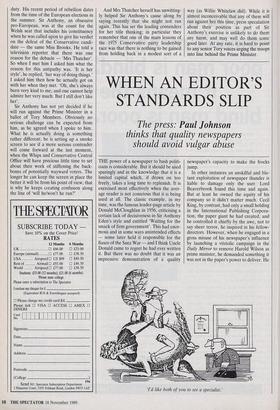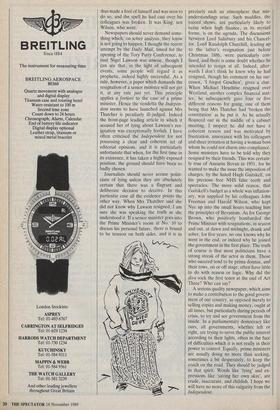WHEN AN EDITOR'S STANDARDS SLIP
The press: Paul Johnson
thinks that quality newspapers should avoid vulgar abuse
THE power of a newspaper to bash politi- cians is considerable. But it should be used sparingly and in the knowledge that it is a limited capital which, if drawn on too freely, takes a long time to replenish. It is exercised most effectively when the aver- age reader is not conscious that it is being used at all. The classic example, in my time, was the famous leader-page article by Donald McCloughlan in 1956, criticising a certain lack of decisiveness in Sir Anthony Eden's style and entitled 'Waiting for the smack of firm government'. This had enor- mous and in some ways unintended effects — some later held it responsible for the fiasco of the Suez War — and I think Uncle Donald came to regret he had ever written it. But there was no doubt that it was an impressive demonstration of a quality newspaper's capacity to make the frocks jump.
In other instances an unskilful and bla- tant exploitation of newspaper thunder is liable to damage only the user. Lord Beaverbrook found this time and again. But at least he owned the equity of his company so it didn't matter much. Cecil King, by contrast, had only a small holding in the International Publishing Corpora- tion, the paper giant he had created, and he controlled it chiefly by the awe, not to say sheer terror, he inspired in his fellow- directors. However, when he engaged in a gross misuse of his newspaper's influence by launching a vitriolic campaign in the Daily Mirror to remove Harold Wilson as prime minister, he demanded something it was not in the paper's power to deliver. He I'd like both of you to see a specialist.' thus made a fool of himself and was seen to do so, and the spell he had cast over his colleagues was broken. It was King, not Wilson, who went.
Newspapers should never demand some- thing which, on sober analysis, they know is not going to happen. I thought the recent attempt by the Daily Mail, timed for the opening of the Tory Party Conference, to oust Nigel Lawson was unwise, though I can see that, in the light of subsequent events, some people will regard it as prophetic, indeed highly successful. As a rule, however, a paper which demands the resignation of a senior minister will not get it, at any rate just yet. This principle applies a fortiori to the case of a prime minister. Hence the vendetta the Indepen- dent seems to have launched against Mrs Thatcher is peculiarly ill-judged. Indeed the front-page leading article in which it accused her of lying about Lawson's res- ignation was exceptionally foolish. I have often criticised the Independent for not possessing a clear and coherent set of editorial opinions, and it is particularly unfortunate that when, for the first time in its existence, it has taken a highly exposed position, the ground should have beep so badly chosen.
Journalists should never accuse politi- cians of lying unless they are absolutely certain that there was a flagrant and deliberate decision to deceive. In this particular case all the evidence points the other way. When Mrs Thatcher said she did not know why Lawson resigned, I am sure she was speaking the truth as she understood it. If a senior minister goes into the Prime Minister's room at No. 10 to discuss his personal future, there is bound to be tension on both sides, and it is in
precisely such an atmosphere that mis- understandings arise. Such muddles, the record shows, are particularly likely to occur when high finance, in its myriad forms, is on the agenda. The discussions between Lord Salisbury and his Chancel- lor, Lord Randolph Churchill, leading up to the latter's resignation just before Christmas 1886, were particularly con- fused, and there is some doubt whether he intended to resign at all. Indeed, after- wards I don't think he knew why he had resigned, though his comment on his suc- cessor, forgot Goschen', gives a clue. When Michael Heseltine resigned over Westland, another complex financial mat- ter, he subsequently gave four or five different reasons for going, one of them being that Mrs Thatcher had 'broken the constitution' as he put it. As he actually flounced out in the middle of a cabinet meeting, I suspect he did not have a coherent reason and was motivated by frustration, annoyance with his colleagues and sheer irritation at having a woman boss whom he could not charm into compliance. Some ministers have to be told why they resigned by their friends. This was certain- ly true of Aneurin Bevan in 1951, for he wanted to make the issue the imposition of charges, by the hated Hugh Gaitskell, on his precious free NHS false teeth and spectacles. The more solid reason, that Gaitskell's budget as a whole was inflation- ary, was supplied by his colleagues John Freeman and Harold Wilson, who kept Nye up into the small hours teaching him the principles of Bevanism. As for George Brown, who positively bombarded the Prime Minister with resignations, in season and out, at dawn and midnight, drunk and sober, for five years, no one knows why he went in the end, or indeed why he joined the government in the first place. The truth of course is that most politicians have a strong streak of the actor in them. Those who succeed tend to be prima donnas, and their rows, on or off stage, often have little to do with reason or logic. Why did the diva sock the first tenor at the end of Act Three? Who can say?
A serious quality newspaper, which aims to make a contribution to the good govern- ment of our country, as opposed merely to selling copies and making money, ought at all times, but particularly during periods of crisis, to try and see government from the inside. In a parliamentary democracy like ours, all governments, whether left or right, are trying to serve the public interest according to their lights, often in the face of difficulties which it is not really in their power to control. Equally, prime ministers are usually doing no more than seeking, sometimes a bit desperately, to keep the coach on the road. They should be judged in that spirit. Words like 'lying' and ex- pressions like 'saving her own skin', are crude, inaccurate, and childish. I hope we will have no more of this vulgarity from the Independent.



























































 Previous page
Previous page